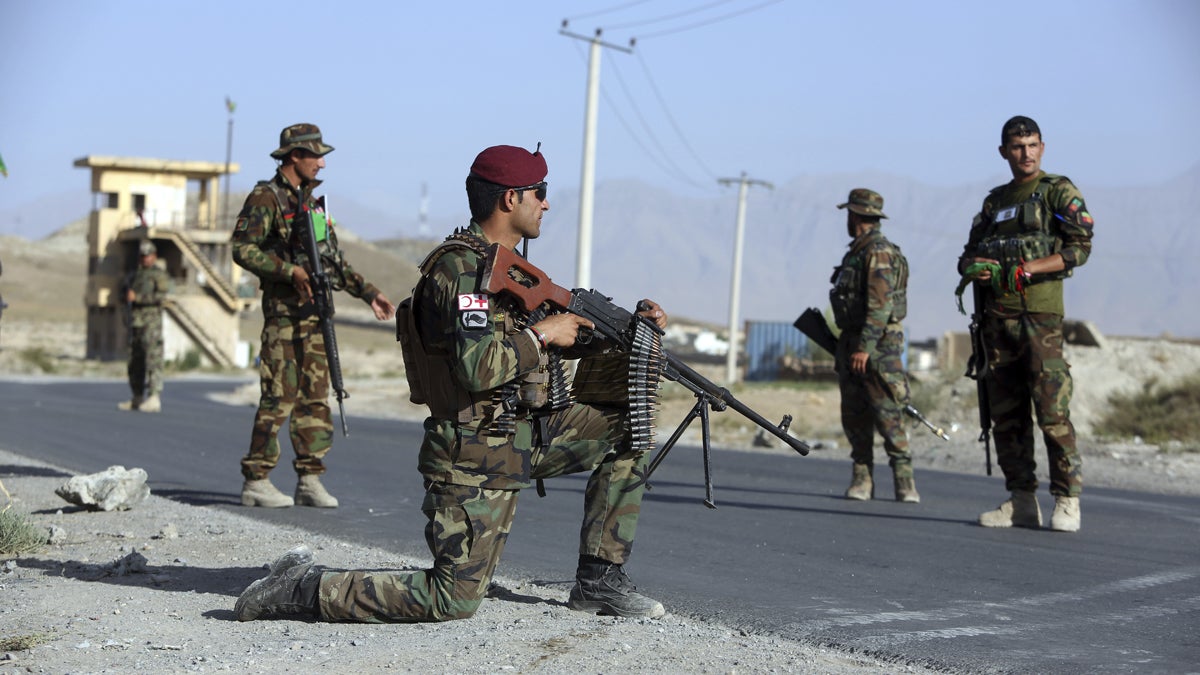From dove to hawk: Trump’s Afghanistan flip flop

Afghan national army (ANA) Soldiers stand guard at a checkpoint on the outskirts of Kabul, Afghanistan, Monday, Aug. 21, 2017. President Donald Trump will use a nationally televised address to outline for a war-weary nation the strategy he believes will best position the U.S. to eventually declare victory in Afghanistan after 16 years of combat and lives lost. (AP Photo/Rahmat Gul)
When Donald Trump was a tweeting private citizen, he cooed like a dove: “It is time to get out of Afghanistan” and “Afghanistan is a complete waste. Time to come home!” and “Why should we keep wasting out money” and “We should leave Afghanistan immediately.”
But now, in the words of political analyst Homer Simpson, “D’oh!”
Running his mouth and running a government are very different. In last night’s Teleprompter address, Trump said we’re staying in Afghanistan and sending more troops (reportedly, a 40 to 50 percent hike on the current 8,500). Yup, it’s one thing to tweet about withdrawal from the cheap seats, but as he confessed, “decisions are much different when you sit behind the desk in the Oval Office.” Turns out, “a hasty withdrawal would create a vacuum that terrorists, including ISIS and al Qaeda, would instantly fill.”
Trump’s decision contradicts his isolationist campaign rhetoric (Oct. ’15: “We made a terrible mistake getting involved there in the first place”), and within minutes of his speech, he was hammered on his right flank by the Bannon-enhanced Breitbart propaganda site. (A portent of his beleaguered future.) One headline: “Trump reverses course … defends flip-flop.” Another headline: “Is Trump’s Afghanistan policy that different from Obama’s?” In the fever swamp, the ultimate insult is to invoke Obama.
But let’s cut the guy a bit of a break. Seriously.
If Trump looks wobbly about Afghanistan — reversing his old stance, groping for a middle ground that gives us a little more presence without risking a new quagmire — he’s just joining an exclusive club. Bush and Obama tried virtually everything, from bombing the Taliban to negotiating, from ramping up to winding down, and still the Afghan regime isn’t stable enough to repel terrorists without our boots and bucks. If we had a magic formula, we would’ve used it long ago.
So now Trump owns this 16-year war. It’s part of his inheritance.
He ain’t happy about that. According to one report, “Trump was frustrated and fuming. Again and again, in the windowless Situation Room at the White House, he lashed out at his national security team over the Afghanistan war, and the paucity of appealing options gnawed at him … A president obsessed with winning has now settled on simply trying not to lose … as long as he could be seen as a strong and decisive leader.”
In other words, Trump on the foreign policy front is trying to walk a tightrope that’s roughly the width of dental floss. It comes with the job. Hillary Clinton would’ve faced the same paucity of good options, and would probably be trying something similar. (During the campaign she rarely dwelled on Afghanistan, and no wonder.) But Trump has a uniquely tough challenge on the domestic front; he has little margin for error in Afghanistan because most Americans don’t trust or respect him.
It’s tough to lead on foreign policy when 61 percent rate the president unfavorably on foreign policy. It’s tough for a president to project himself as a credible commander-in-chief when 63 percent of Pennsylvanians, 64 percent of Michigan citizens, and 64 percent of Wisconsites (the ’16 swing states) say that they are actually “embarrassed” by the guy.
Another complicating political factor: Republicans, and conservatives generally, are seriously split about Afghanistan. This is not new. As far back as the spring of 2011, a Gallup poll reported that 47 percent of Republicans wanted to bring the troops home — a stunning stat, because most Republicans traditionally had embraced the hawkish credo of muscular intervention. Mitt Romney, stumping for the ’12 nomination, addressed that war weariness; referencing Afghanistan, he said during a debate: “Our troops shouldn’t go off and try and fight a war of independence for another nation.”
Today, there’s a veritable chasm between the bring-’em-home camp (led by Bannon and the Breitbarters; Bannon lost his White House fight for a smaller footprint), and the hawkish interventionists (like Lindsey Graham and John McCain) who are basically in sync with Trump’s military brass (H. R. McMaster, James Mattis, John Kelly). If the Afghanistan slog deepens, Trump could take heat from both sides — for not doing enough to pull back, and for not doing enough to push forward.
He does have one advantage: Most Americans tuned out Afghanistan long ago. It’s not a major voting issue. The general consensus is that the place has always been a mess, and will remain so regardless. If Trump moves the ball one yard at a time, forward or backward, as is likely, Afganistan will rarely crash the news cycle.
On the other hand, remember when Trump stumped with his lament that “we don’t win anymore”? With his promise that “we’re gonna win, folks”? Those lines are so 2016.
Nobody knew that prosecuting a war could be so complicated.
—
Follow me on Twitter, @dickpolman1, and on Facebook.
WHYY is your source for fact-based, in-depth journalism and information. As a nonprofit organization, we rely on financial support from readers like you. Please give today.




